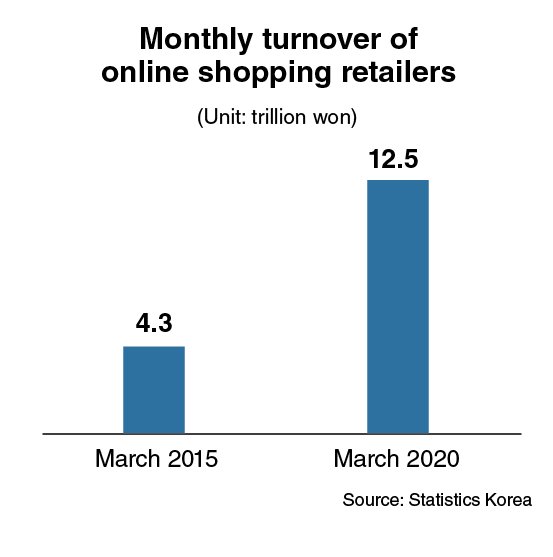[News Focus] Korea sees online shopping grow 190% since 2015
By Kim Yon-sePublished : May 31, 2020 - 14:10

SEJONG – The online shopping market has become a core factor for the nation’s gross domestic product in recent years, as it makes up a core portion of household consumption.
Data from Statistics Korea showed that the monthly turnover of retailers operating online retail operations came to 12.58 trillion won ($10.16 billion) in March. It posted growth of 191.8 percent over five years, from 4.31 trillion won in March 2015.
The monthly turnover has continued to surge -- to 5.22 trillion won in March 2016, 7.74 trillion won in March 2017, 9.37 trillion won in March 2018, and 11.25 trillion won in March 2019.
The comparison of 2019 and 2020 figures indicates that online shopping transactions are robust despite the sagging index in the nation’s total household consumption in the wake of COVID-19.
By segment, products of agricultural, livestock and fisheries posted the highest on-year growth (91.8 percent) in March this year, as households hesitated to visit restaurants amid the spreading epidemic. Its February growth peaked at 102.8 percent, compared to a year earlier.

Data suggested that the smartphone shopping percentage has further grown in particular. The proportion of mobile shopping of total online sales has increased by 25.6 percentage points -- from 41.7 percent in March 2015 to 67.3 percent in March 2020.
The monthly turnover exceeded the mark of 10 trillion won in October 2018 for the first time in history after topping 8 trillion won in September 2017.
The marked growth of online shopping transactions has been backed by systematic parcel delivery services, which send products to consumers across the country in one to three days.
Almost every kind of product -- from drinking water, food and cosmetics to clothing, home appliances and furniture -- is available online. A growing proportion of consumers were found to have purchased goods offered by department stores and large discount chains via the internet.
“Data shows changing consumption trends like diversification of food retail services or preference for convenience food,” said an official at the Ministry of Agriculture, Food and Rural Affairs.
Recently, local specialties including fresh agricultural products in rural districts nationwide are drawing popularity online.
The official said that local farmers from nine provinces deliver consumers soy-sauce-marinated crab, leaf mustard kimchi, groundsel-flavored macaroons and makgeolli.
“Urbanites are attracted to homemade food or liquor products from microbusinesses in rural areas on the back of direct deals online,” he said. “The consumption trend is positive in terms of elevating the income level of farming, forestry and fishery households.”
A noteworthy point since 2018 is that a growing number of people in their 60s have joined the fray of online shopping.
A retail services analyst said seniors are the main buyers of goods with high price tags. “They purchase products such as luxury fashion items, couches and high-end air conditioners or TVs.”
Meanwhile, pessimists claim that a major internet portal holds an oligopolistic status by providing settlement platforms to agricultural or industrial goods producers.
A cybermall operator said the sales disparity between large and smaller online retailers is widening. “Brokerage service charges for consumers’ credit card payments are also a burden for micromall operators.”
Retailers, nonetheless, welcome the rapid growth in online sales. A beef tripe seller at a traditional market in Incheon said she could sell her products that have become well known on TV not only to locals, but also to consumers across the country.
She sells products via both her own online retailer and a platform offered by an internet portal operator.
By Kim Yon-se (kys@heraldcorp.com)









![[Kim Seong-kon] Democracy and the future of South Korea](http://res.heraldm.com/phpwas/restmb_idxmake.php?idx=644&simg=/content/image/2024/04/16/20240416050802_0.jpg&u=)







![[KH Explains] Hyundai's full hybrid edge to pay off amid slow transition to pure EVs](http://res.heraldm.com/phpwas/restmb_idxmake.php?idx=652&simg=/content/image/2024/04/18/20240418050645_0.jpg&u=20240418181020)

![[Today’s K-pop] Zico drops snippet of collaboration with Jennie](http://res.heraldm.com/phpwas/restmb_idxmake.php?idx=642&simg=/content/image/2024/04/18/20240418050702_0.jpg&u=)